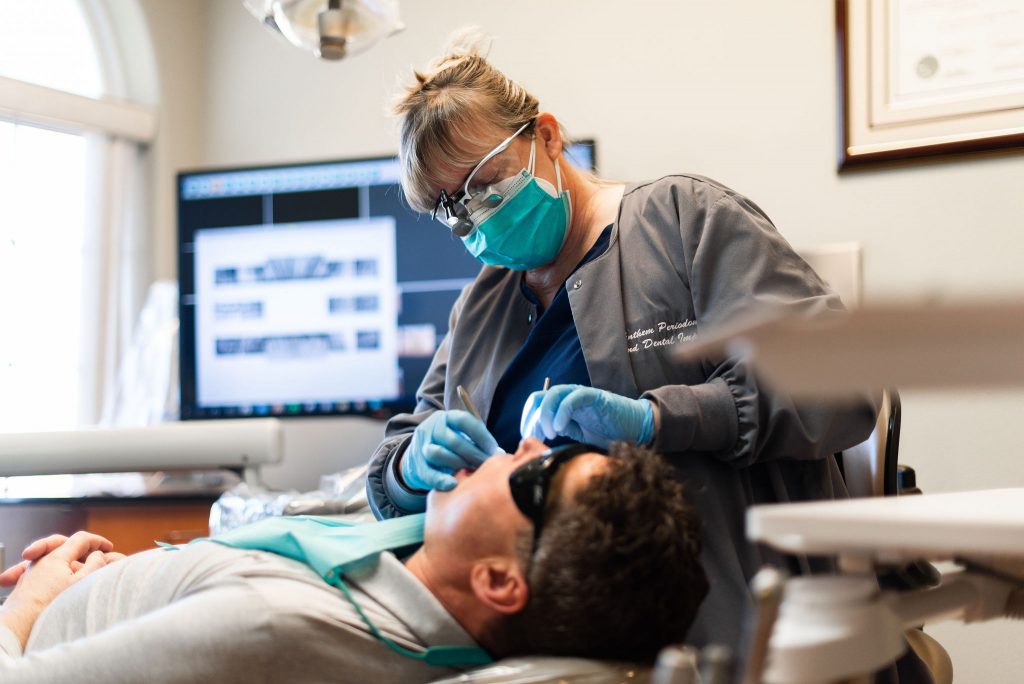Sedation Dentistry IN LAS VEGAS & HENDERSON, NV
ANTHEM PERIO, LAS VEGAS' CHOICE FOR ADVANCED PERIODONTICS
At Anthem Periodontics and Dental Implants, we offer a range of dental sedation options to ensure our patients receive care in as relaxed and pain-free manner as possible. Sedation dentistry encompasses a wide range of medications designed to depress the central nervous system, which will alleviate anxiety and reduce or eliminate procedural pain. There are several different methods of administration, including oral sedation, sedation that is inhaled (laughing gas), and IV sedation for more intensive procedures. Sedation also varies in intensity, ranging from mild, medium, and deep, as well as conscious or sleep sedation.
Benefits of Sedation Dentistry
Patients who have sedation dentistry performed will benefit in the following ways:
- Improves your periodontists’ ability to safely and efficiently provide treatment
- Improves your ability to cooperate with your periodontist
- Gag reflex becomes less reactive
- Increases your overall comfort
- Reduces anxiety
- Allows certain procedures to be performed
- Medium to deep sedation may alter the patient’s sense of time
- Deep sedation will likely result in the patient having no memory of the procedure occurring
Process of Administering Dental Sedation
Dental sedation can be administered in the following ways:
- Inhalation: The most commonly used dental sedation method, nitrous oxide is administered through a mask placed over your nose. Nitrous oxide can easily be adjusted to optimize your comfort level and is an effective method for reducing pain and anxiety. Effects of nitrous oxide also disappear shortly after the mask is removed, making it the only type of dental sedation that does not require someone else to drive you home following use.
- Oral: Sedative is delivered in pill form. Oral sedation is given to you in office prior to your procedure. Oral sedation is an effective method for reducing anxiety and discomfort. You do not experience deep sedation with oral sedation. Pre operative instructions are reviewed with you prior to your appointment.
- Intravenous (IV): With our Anesthesiologist, a sedative is delivered into the vein, where the level of sedation can be adjusted to optimize your comfort level. Effects of IV sedation occur quickly. Pre operative instructions are reviewed with you prior to your appointment.
Do you Want To
Improve Your Oral Health or Replace Missing Teeth?
Types of Dental Sedation
There are three sedative states your periodontist can administer, which include the following:
- Mild Sedation: Mild sedation is typically used for patients having relatively minor to moderate procedures. Mild sedation is an effective method for reducing or eliminating pain and helps patients manage dental phobia or generalized anxiety. If mild sedation is provided in pill form, patients will typically take the oral sedation one or two hours prior to the appointment so effects can kick in by the time the procedure is performed. Nitrous oxide (also known as laughing gas) is another form of mild sedation administered through a mask placed over your nose. The gas is an effective method for helping patients relax. Mild sedation will not result in amnesia or falling asleep during the procedure, although it may make patients feel somewhat sleepy. Effects of mild sedation typically go away within a few hours of having the procedure performed.
- Moderate Sedation: Moderate sedation is typically used for patients having more complicated procedures, or who have dental phobia or generalized anxiety. Moderate sedation is generally administered through an IV, which allows your periodontist to adjust sedation levels as needed. Moderate sedation will not result in amnesia or falling asleep during the procedure, although it will place you in a deeper state of relaxation.
- Deep Sedation: Deep sedation is typically reserved for patients having complex, invasive procedures and/or patients suffer from severe dental phobia or anxiety. Deep sedation is commonly administered into the vein (IV) and can be adjusted to optimize the patient’s comfort level. Patients may remain in a conscious state, still able to respond to commands or be unconscious or essentially asleep during the procedure. Patients who receive deep sedation will typically have no memory of the procedure. Effects of deep sedation take some time to wear off, so it will be necessary to have someone drive you home following the procedure.
Cost of Dental Sedation
The cost of your dental sedation is dependent on which form you choose. Intravenous sedation is dependent on the length of your appointment and would be paid for after your appointment by your caretaker directly to your Anesthesiologist based on their fee’s. Oral sedation and Inhalation (Nitrous oxide) fees are reviewed upon scheduling.
Before scheduling your appointment, we will provide an estimated total cost and answer any questions you have concerning payment plan options, such as Care Credit which offer interest-free payment plans for six-to-twelve-month periods and/or a payment arrangement made in advance with our office.
For your convenience, we accept MasterCard, Visa, Discover, and American Express.
Schedule Your Appointment
Although nearly all patients are potential candidates for sedation dentistry, patients who meet any of the following criteria may especially benefit from the use of dental sedation:
- Anxiety disorder or dental phobia
- Extremely sensitive teeth
- Difficulty achieving numbness
- Heightened gag reflex
- PTSD
- Autism
- Fear of needles
- Undergoing invasive, complex procedures
At Anthem Periodontics and Dental Implants, your oral health is our number one goal. We are committed to providing you with the comprehensive periodontal support you need to continue enjoying a bright, healthy smile. To learn more about dental sedation or schedule an appointment, contact our office at (702) 270-4600. We look forward to providing you with quality care tailored to your unique needs!


